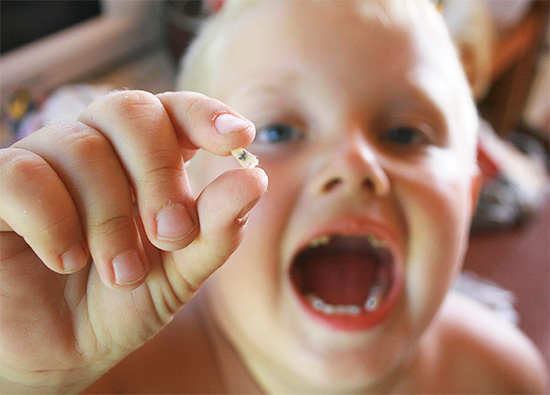
According to statistics, almost every third child in most regions of Russia has teeth that begin to deteriorate immediately after eruption, that is, already from 5-6 months of age. Many parents blame bad water, genetics, and even the baby itself, but in fact in most cases they themselves are to blame, because they did not start caries prevention in time during the eruption of the very first temporary teeth in a child.
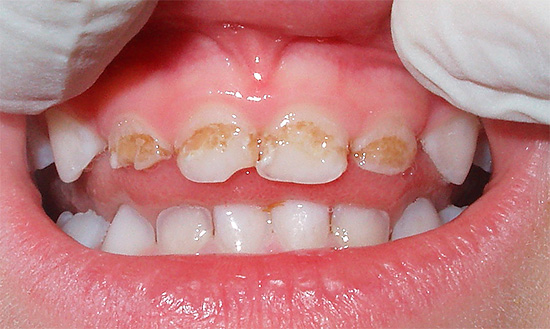
It is known that the disease is easier to prevent than to cure, but, as practice shows, not all follow the commandments of this simple truth, and for some reason they treat care about the prevention of caries in their children rather carelessly. Such carelessness often leads to serious consequences: after some time, the baby teeth are destroyed to such an extent that they begin to bring the child great suffering, often many teeth simply cannot be saved.
Premature removal almost always leads to displacement of the teeth, violation of the dentition and the formation of abnormal bite, which implies its long-term and often expensive orthodontic treatment in the future (braces, plates). Well, if even then everything is allowed to take its course and not correct the bite, then the child already in the preschool period begins to form complexes that traumatize his psyche, as well as speech defects. In addition, the shape of the face may change.
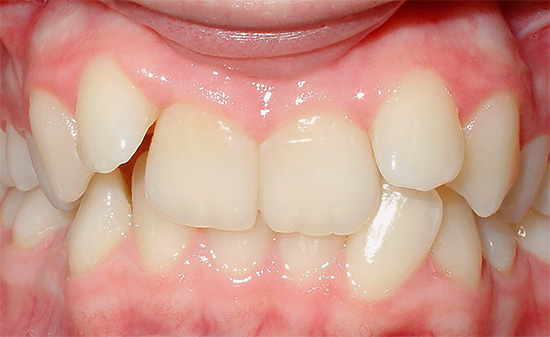
This is only a part of possible undesirable consequences, which can be easily avoided if one engages in the prevention of caries from the moment the very first baby tooth appears in the child and in the future competently complements the necessary measures as the baby grows.
Prenatal prophylaxis and its importance for mother and unborn child
Unfortunately, many young couples do not even realize that the prevention of caries in their unborn child should begin even during pregnancy. Antenatal prophylaxis is a system of measures aimed at preventing caries in the future in a child and carried out at the stage of intrauterine development of dental germs.

It is during the antenatal period that it is very important how the tissues of the future teeth will form, how mineralized they will be. For example, due to the lack of minerals in the body of a pregnant woman, toxicosis during pregnancy, various health problems, the baby sometimes has teeth that are not very resistant to the development of caries.
To ensure the correct placement of the rudiments of temporary teeth in an unborn child and, thus, to prevent caries in a baby in the future, a woman in the antenatal period needs to take a number of specific measures. It is important to keep in mind that you need to take care not only of the teeth of the future baby, but also of their own, because during pregnancy they can begin to deteriorate very quickly due to a decrease in the remineralizing properties of saliva.
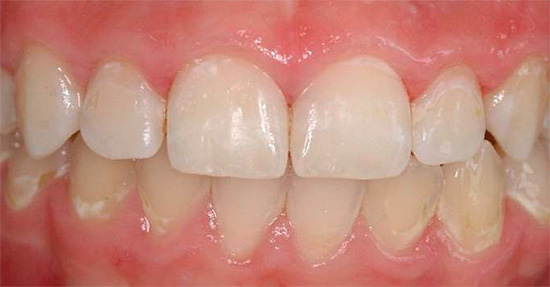
- Observe the correct mode and nature of food: increase the amount of foods containing calcium in the diet, limit the consumption of carbohydrates (sweets, flour products), especially in between the main meals.
- Monitor oral hygiene: carry out mechanical cleaning of tooth surfaces from plaque with brushes and dental floss.
- Undergo a comprehensive medical examination not only during pregnancy planning, but also during it.
- To carry out prevention and treatment (reorganization) of carious lesions at the dentist, since microorganisms that multiply in them can have a long-term negative effect on the development of the fetus.
- To carry out professional teeth cleaning in a certain trimester of pregnancy on the recommendation of a doctor.
- In consultation with the doctor, use vitamin and mineral complexes aimed at preventing the deficiency of beneficial substances - both to ensure the health of the woman herself and for the proper development of the dental germs of the fetus in order to increase their resistance to caries in the future.
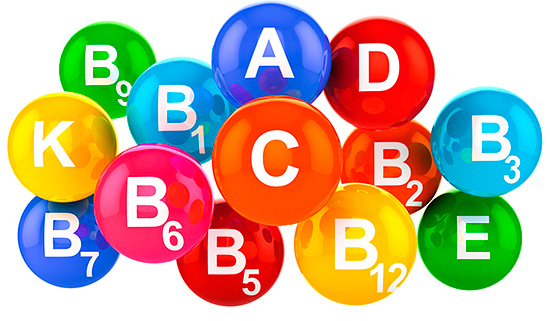
On a note
Very conventionally, vitamin complexes can be divided into three groups:
- Economy class: Complivit Mom, Alphabet Mom's health, etc .;
- Middle class: Vitrum Prenatal, Multi-tabs Perinatal, etc .;
- Premium class: Elevit Pronatal, Materna, etc.
What to feed the child for additional protection against tooth decay
To prevent caries in children of preschool and school age, endogenous and exogenous systems of preventive measures were developed.
Endogenous prophylaxis is aimed at saturating the teeth with important mineral components from the inside, that is, when ingesting certain foods or medications. However, before you feed the child with ready-made complexes for the prevention of caries, you should first adjust the diet as a whole.

For example, it is important to understand that foods containing carbohydrates, for the most part, provoke caries, because they are food for cariogenic bacteria. Therefore, restricting the consumption of sweets to about 3-4 years of age is a fairly effective solution to the problem.
If you remove sweets and other confectionery products from the child’s diet, it is necessary to limit them at least partially and especially to exclude them from the intervals between meals. Thus, the time spent for carbohydrate residues on the surface of a child’s teeth will be reduced, and conditions will also be created for the return of lost minerals to the teeth from saliva (saliva has natural mineralizing properties with respect to hard tooth tissues).
In addition, there are products that are well suited for cleansing the oral cavity - these are hard fruits and vegetables. During their chewing, food debris is removed and saliva is plentiful, which eliminates the microbial factor.
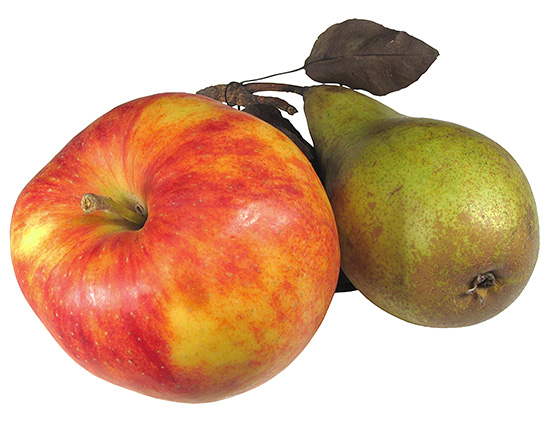
On a note
Prevention of caries in children of preschool and school age in certain cases can be supplemented by the use of fluorinated water, salt, milk, as well as fluorine-containing tablets. These systemic prophylaxis methods can be applied only after consulting a dentist who can prescribe them, for example, at a low concentration of fluoride in drinking water in a particular region.
As part of caries prevention, it will be useful to reject sweet fruit juices, as well as soda in favor of mineral water or not too strong tea. A lot of useful substances for teeth are found in low-fat varieties of fish and seafood (especially phosphorus and vitamin D, contributing to better calcium absorption).
Products containing calcium (cottage cheese, cheese, milk, cream, etc.) are ideal for systemic prevention of dental caries in children, however, it is worth remembering that it is necessary to brush the child's teeth after each such meal, since dairy products are an excellent breeding ground for cariogenic bacteria.

To enhance the effect of the systemic factor, after consultation with the pediatrician, it is possible to introduce to the main diet the intake of multivitamin and mineral complexes that also contribute to the prevention of caries (for example, Junior Neo, Junior Be Big Calcium, Vitamishka calcium +).
The secret to effective hygiene through an integrated approach
In addition to restricting the consumption of sweet and rational nutrition, to prevent caries in children of preschool and school age, it is necessary to apply the so-called exogenous methods of prevention.
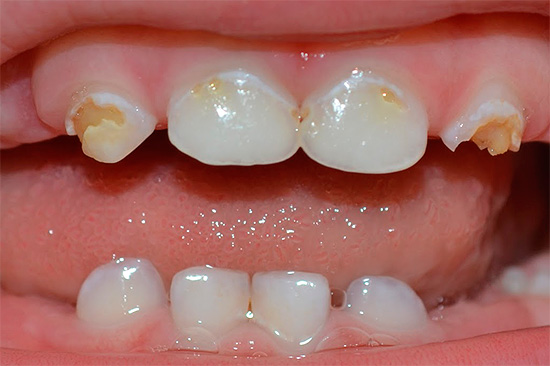
These include:
- Careful oral hygiene and parental control;
- The use of children's toothpastes and rinses, as well as dental floss for cleaning interdental spaces;
- Professional oral hygiene at the dentist (removal of plaque and stone);
- Remineralization of enamel and its deep fluoridation for the prevention and treatment of caries in the stage of stains (held in the dentist's office).
Regular and thorough oral hygiene is a very important link in the prevention of caries in children, because without permanent mechanical removal of dental plaque there will be no effect even with proper nutrition and taking fluoride-containing drugs.
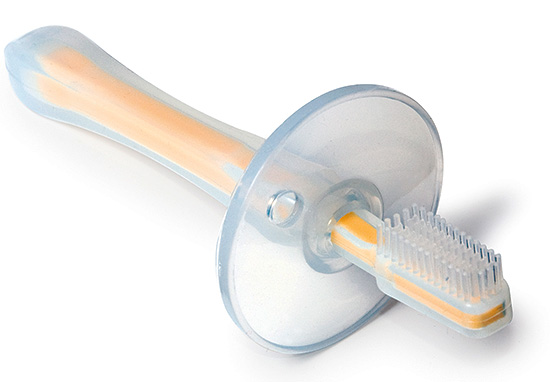
Pediatric Dentist Board
In no case should the child be forced to brush his teeth forcibly, as this will form a negative attitude towards hygiene for life. Attach your baby to preventive measures is recommended in a relaxed game form.
In this case, you should purchase a brush recommended for the age of your child, for example, with a funny shape in the form of an animal or cartoon character. Most children readily begin to repeat when they see how mom and dad brush their teeth in the morning after eating and in the evening before bedtime.
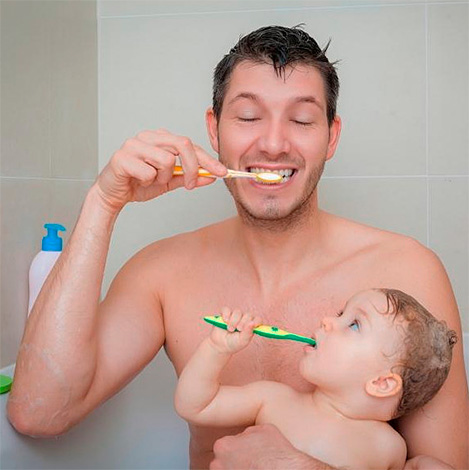
Toothpastes in the first years of the baby’s life, up to about 3-4 years old, do not contain fluoride, but they help with the mechanical cleansing of the teeth, creating foam. Fluorides are excluded from the composition of such toothpastes for the reason that a child can often swallow up to 30% of the paste used.
With each subsequent year in pasta,recommended for a certain age category, a small amount of fluoride appears, strengthening children's enamel and preventing its demineralization under the influence of cariogenic factors. Often, antiseptics and enzymes are also injected into children's toothpastes to fight bacteria and to reduce the rate of plaque formation. These pastes should be applied in a course of no more than 2 weeks, since the microflora of the oral cavity can gradually become resistant to their action.
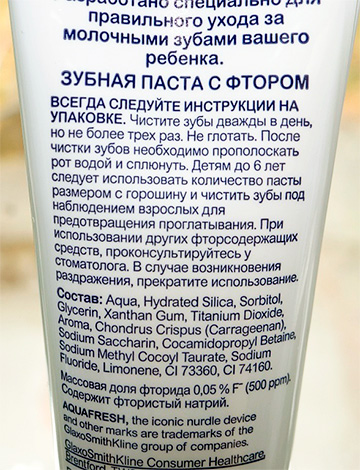
Professional oral hygiene (that is, in the dentist's office) is especially important for the prevention of caries in children of school age, since it is during this period that you can find not only pigmented plaque, but even tartar. Often, after removal of dental deposits, it is possible to detect foci of initial caries and, thus, have time to prevent its further development.
As noted above, for the prevention of carious lesions of dairy and permanent teeth in children, remineralization of tooth enamel and its deep fluoridation can be performed (simply speaking, this is the saturation of hard tooth tissues with mineral components).For the prevention of caries in children of preschool and school age, special solutions, varnishes and gels are used for this purpose.
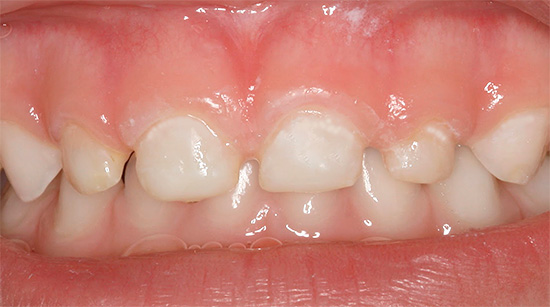
Lucky can be applied to the teeth with special brushes or in the tray, which is more effective. Often, to obtain a quick result, electrophoresis of calcium and fluorine compounds is used: due to currents of low voltage, useful compounds penetrate into the enamel more easily.
The alternation of drugs for remineralization (for example, Remodent) and for deep fluoridation (for example, Enamel and Dentin-sealing liquid) at the reception at the dentist allows you to protect children's tooth enamel for a long time against caries.
Healthy teeth that are "sealed" from caries
The so-called sealing of fissures is a procedure for “sealing” the chewing surface of the teeth with a special sealant (silane), which allows for effective and long-term prevention of caries both in schoolchildren and in preschool age. The procedure is performed at the reception at the dentist for certain indications, the main of which is the presence of deep and closed fissures.
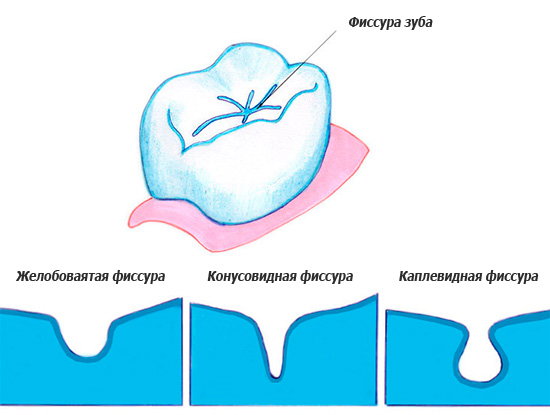
Depending on the fissure mineralization (the degree of saturation with the mineral components of the enamel), the sealing is carried out:
- immediately after teething (with normal mineralization);
- with mandatory course preparation of the tooth for sealing by special treatment with fluoride and taking calcium-fluorine-containing products and preparations (with an average degree of mineralization of enamel);
- or use glass ionomer sealants without etching the enamel with acid (with low mineralization).
With high mineralization of fissures, sealing can be omitted. In most cases, the sealing of fissures is carried out at the age of 6-13 years.
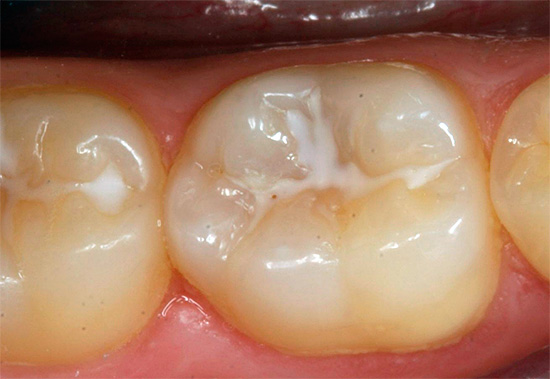
It is important to know
Especially important is the sealing of the sixth permanent teeth, which erupt in a child already at the age of 6 years old and tend to collapse faster than all other permanent teeth. At the same time, the normal bite, its height, etc., largely depends on these teeth.
Preventive sealing of fissures is carried out with special preparations: glass ionomer and composite materials are more often used as sealants.There are methods of non-invasive (without preparation) and invasive sealing (using fissurotomy burs for opening fissures before sealing).
For non-invasive sealing, fluid sealants are used, hardening themselves or from light from a lamp. The main stages of non-invasive sealing:
- Treatment of the tooth from plaque and food debris;
- Isolation of saliva and drying;
- Putting on the surface of the fissure solution of phosphoric acid;
- Rinsing with distilled water;
- Drying and applying a liquid sealant to fissures;
- Waiting for hardening or activation of silane using a lamp;
- Removal of excess material and quality control seals from the sealant;
- Mandatory sealing control after 3-6 months.
The procedure takes an average of 10-40 minutes and delivers almost no pain.
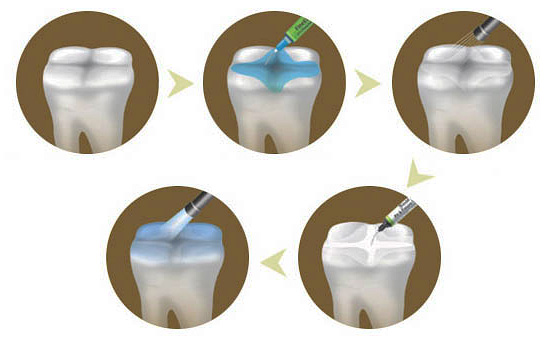
The preventive effect of sealing is ensured by the closure of the enamel areas in the fissures unprotected from caries from external environmental influences, as well as fluorine compounds introduced into the sealant. The effect of sealing and, accordingly, preventing the development of caries in this area of the tooth, is usually achieved from 1-2 to 7-8 years.
Educational program for parents: debunking some myths about children's teeth
At the dental reception, every doctor regularly has to answer questions from parents of babies. Many of these questions for doctors seem too repetitive, strange, funny, boring, and even anecdotal, but this is the case when the patient is always right and deciphering the most popular ones is possible and necessary.
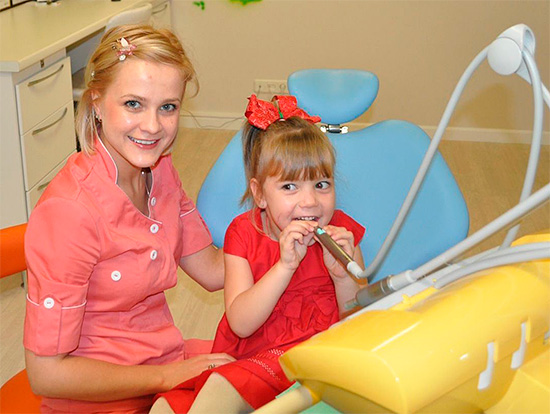
So…
Why keep baby’s baby teeth if they fall out anyway?
Perhaps this is the most popular question, which often determines the level of education of a person. The fact is that the protection of milk teeth is a contribution to the health of permanent. Often, the baby’s deciduous teeth decaying from caries cause irreparable damage to the germ of a permanent tooth, and it may not appear at all. Caries is an infection, so the child’s immunity can sometimes not cope with other sores if it is constantly loaded and exploited. Dental impairment due to premature tooth extraction is a misfortune for the future bite, the child’s mind and parents, who after the fact learn about the financial component of solving this problem.Therefore, prevention of dental caries is an invaluable contribution to the health of the teeth and the overall health of children.
At what age can your child brush their teeth?
Pediatric dentists are advised to begin prevention of caries in the baby before the appearance of teeth: gums are wiped with a gauze pad dipped in warm boiled water in the morning and evening. With the advent of the first tooth (about 6-10 months), mom or dad brush it with a special brush-fingertip - it is made from hypoallergenic rubber and is put on the finger. Soft silicone bristles perfectly remove plaque and carry out caries prevention in young children. And to teach a child to a toothbrush should be approximately 1.5-2 years.
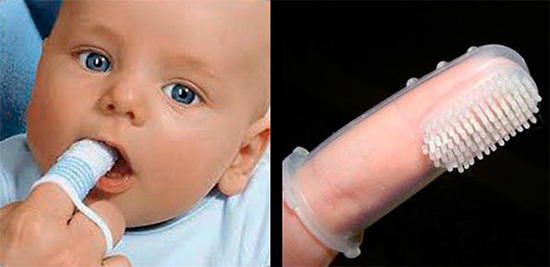
What if my child does not have the opportunity to brush his teeth well, as they are uneven?
Unfortunately, when milk teeth do not erupt properly or there are irregularities in the buds of permanent teeth, an incorrect bite can form or problems arise with the arrangement of the teeth in the dentition. In such cases, it is often impossible to clean all surfaces of the teeth fully and thereby reliably prevent the development of caries.The help of an orthodontist who is able to assess the clinical situation and set a time when corrective structures can be installed (for example, braces) is needed.
As you can see, the importance of preventing caries in childhood is difficult to overestimate, and it depends on the parents whether the child’s teeth will be healthy and beautiful in the future. Take note of this and ... act!
Interesting video about the methods of caries prevention in children
What it is important for parents to know about caries of baby’s baby teeth

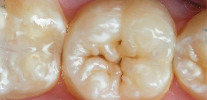
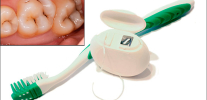
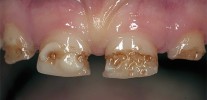
Very nasty photos.